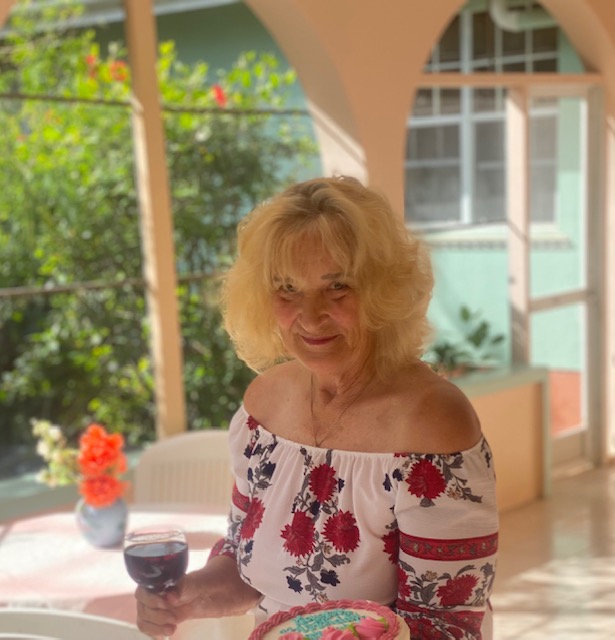
Our speakers were Margaret Carley and Andriy Dubovyy.
Today (n.b. May1st 2022) your correspondent reports on the lunch meeting of April 29th 2022 (quite obviously, some dating precision is required of these rapidly evolving events). The subject was Ukraine: at the time this publication, the central drive southwards to Kiev (as it was) is bogged down by half-mud-submerged Russian tanks and supply vehicles (apparently mostly abandoned by the Russians) and a siege of Mariupol that is characterized by Russian pounding of that port city by rockets and artillery with the apparent purpose of reducing the city to uninhabitable ruination. Nevertheless it is quite apparent, if only from the newscasts and video images from that ravaged country, that Ukrainian morale is much higher than might be expected.
In that light, we were privileged to welcome as our speaker Margaret Carley, a good Canadian ‘teacher', a former BMO executive, and latterly real estate agent, who had the good fortune to be born in Ukraine, still speaks Ukrainian, and reveres her status as a native-born Ukrainian. And it was not by mistake the she brought with her another, somewhat younger, Ukrainian who works in the media.
A brief history of Ukraine did not come amiss, it being one of the most unfortunately-placed racial/national groups in the western world. Ukraine is in many respects not so much a nation as an historical and geographic conception of a discrete people who have experienced invasions, racist upheavals, and a fractious history, all of which have been largely dictated by geography and geology. As Margaret reviewed the history of Ukraine, one sees a ’nation’ conceived in strife and the ambitions of others who discerned in its alluvial plain a cornucopia of economic resources, and a population that it was relatively easy to attack and subjugate. In earlier times, the region (it is best to describe it in those terms for a few centuries) was the largest component of the Lithuanian Empire, itself the largest ’nation-state’ in Europe for much of the 16th and 17th centuries, which perhaps saw its splendour quickly excised at the seminal Battle of Tannenberg in 1410, but thereafter the ‘Polish’ component of which revived, until in 1618 the Polish-Lithuanian Commonwealth was twice the size of France, a period after which the 1658 Russo-Polish War occurred, during which, in essence, Russia ‘absorbed’ Ukraine.
The history of Eastern Europe as studied today is largely one of fractional indifference: immensely complex, fraught with irrational strife, and complicated by the lure of certain economic and geographical anomalies (the centrality of the Ukrainian plains and the ending of the Hungarian plains at the Eastern extremity of Austria) that has almost precluded an understanding of the region at times other than those of horrendous strife (Teutoburger Wald, Napoleon’s invasion of Russia, and the 1st and 2nd World Wars), such that the afternoon’s history lesson was one that made us appreciate how limited is our Western sense of weltanschauung. Given the time limitations, the ‘lesson’ was necessarily curtailed: further study can well be continued in Volume 1 of The Bolshevik Revolution by E.H.Carr … a heavy read but a worthwhile one.
But we were not finished. After Margaret, we heard from her guest, Andriy Dubovyy, who proudly sported a Ukrainian-flag badge, and who told us even more about the reality of Ukraine, its people, the nation and the country itself. Obviously a ‘son of the soil’ he described the strength of the nation in its sense of unity (assisted of course by its President) and the will to survive of the people. He described the soil of the nation as being almost it raison d’être, Russia and Ukraine producing a very large proportion of the global supply of grains. Naturally he addressed the nature of the resistance as being solid and well-lead, but needing, of course, modern and relevant armaments. It became evident that we were seeing something of the reason why the Russian Army was being demonstrated to be something of a paper tiger … and simultaneously as an international pariah.
Given the times in which we are living, and the very real support that the Ukrainian people are receiving, this presentation was one that could probably have occupied us for the rest of the afternoon: its complexity was manifest and the obvious interest in the listeners was such that could probably have occupied another hour or two in what became a necessary history lesson. We are however obviously going to have to wait for a good while to see how it all ends: but we will likely not have a problem in obtaining more, and equally relevant, speakers when such a time arrives.